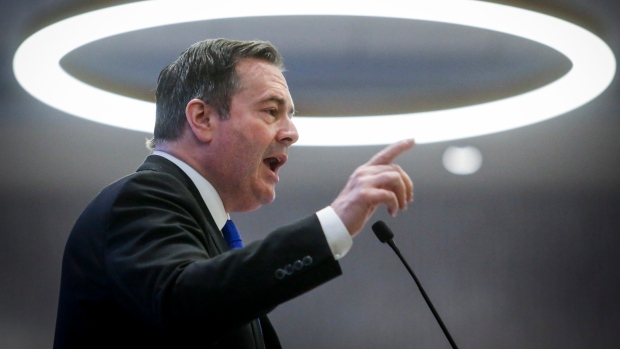Apr 8, 2020
The Daily Chase: Kenney sees negative oil prices; one-on-one with RBC's CEO
By Noah Zivitz

It was blunt talk from Alberta Premier Jason Kenney last night in his address to the province. “There is a very real possibility that, as global inventories overflow, our energy will hit negative prices.” Who would have thought more than a decade ago when then-Prime Minister Stephen Harper championed Canada as an emerging energy superpower, that today we’d be having a discussion about producers potentially paying customers to take oil off their hands? Kenney’s candour came the same day Western Canada Select crude oil sank 56 per cent to US$3.92 per barrel, and just a few hours after he said the province’s unemployment rate could hit 25 per cent.
We’ll have plenty of insight today on the stakes for Canada’s energy heartland, the economy, and what the federal government needs to do about it, with the likes of Precision Drilling CEO Kevin Neveu, Calgary Mayor Naheed Nenshi, Canadian Association of Oilwell Drilling Contractors CEO Mark Scholz, and Brad Wall all lined up for interviews.
IN CONVERSATION WITH RBC’S CEO
Speaks for itself. Dave McKay joins us at 1 p.m. ET to discuss Royal Bank of Canada’s coping strategy for the pandemic and its economic implications. In the span of eight days, we’ll have heard from the CEOs of four of the Big Six banks. We’re still trying and hoping to line up conversations with Scotia’s Brian Porter and National’s Louis Vachon.
WAGE SUBSIDY TWEAKS
A couple business groups (including CFIB) have put out releases about tweaks to the wage subsidy program in draft legislation (including 15 per cent being the revenue-decline threshold to qualify for March, and being given the option of comparing revenue to Jan/Feb instead of same month a year earlier). We asked the finance minister’s office to confirm. Got a “stay tuned” response.
BRACING FOR JOBS DAY
First and foremost, an important programming note: BNN Bloomberg will be up live tomorrow at 8:30 a.m. ET for instant analysis of the monthly Canadian Labour Force Survey. Last time I checked, the estimates for March force you to do a double take: the median among economists surveyed by Bloomberg is for a loss of 500,000 jobs. The most dire prediction is from Citigroup, with its call for a loss of 1.1 million jobs; the most optimistic call (if we can call it that) is for a loss of 100,000 positions. We’ll set the table today before Jon Erlichman handles the breaking news coverage tomorrow morning LIVE at 8:30.
OTHER NOTABLE COVID-19 DEVELOPMENTS
-Air Canada this morning confirmed it plans to tap the federal government’s emergency wage subsidy program, retroactive to March 15, and that it will “retain or return affected workers” for the duration of the program. Keep in mind that Air Canada said last month it was temporarily laying off 16,500 employees.
-Maple Leaf Foods says it is suspending operations at its poultry plant in Brampton, Ont. “out of an abundance of caution” as a result of three COVID cases in the facility.
-Telus said today its CEO, Darren Entwistle, is forgoing three months’ worth of salary and directing those funds instead to Canadian healthcare workers
-The employment outlook among small businesses is rapidly deteriorating. According to the Canadian Federation of Independent Business’s latest confidence barometer, 63 per cent of business owners now say they’re planning layoffs, compared to 50 per cent who were eyeing cuts when the last index was released on March 25. The CFIB’s overall index has, however, inched up seven points to 37.7 at the start of this month – albeit still below levels registered in past recessions.
-S&P has lowered Australia’s outlook to negative, meaning it’s one step removed from losing its AAA credit rating. Why should we care? Australia is one of only ten countries that have AAAs from all three major credit rating firms. Canada is another. It’s worth remembering that when we asked Finance Minister Bill Morneau last week whether he’s at all concerned Canada’s spending could put it offside with a AAA rating, that’s when he said he’s focused on “ensuring that we actually have an economy coming out of this.” Have your say on the importance of having a AAA rating in today’s BNNBloomberg.ca poll.
-Jack Dorsey is a donating a big chunk of his equity in Square (representing 28 per cent of his total wealth) to a charitable fund whose first mission is to “disarm the pandemic”.
-Cogeco Communications has withdrawn its full-year forecasts, while saying it doesn’t expect the pandemic to have a significant impact on its free cash flow. Separately, the company reported a dip in second-quarter adjusted profit, with its CEO acknowledged it faced “greater investments in promotions and sales and marketing activity.”
-Héroux-Devtek withdrew its full-year forecast late yesterday as a result of the pandemic’s impact on the aerospace industry.
NOTABLE RELEASES/EVENTS
-Notable data: Canadian building permits and housing starts
-Wuhan lockdown ends
-9:30 a.m. ET: RBC annual meeting
-10:30 a.m. ET: CIBC annual meeting
-11:15 a.m. ET: Prime Minister Justin Trudeau addresses Canadians from Ottawa
-2:00 p.m. ET: U.S. Federal Reserve releases minutes from last meeting
-5:00 p.m. ET: U.S. Coronavirus Task Force holds briefing at the White House
Every morning BNN Bloomberg's Managing Editor Noah Zivitz writes a ‘chase note’ to BNN Bloomberg's editorial staff listing the stories and events that will be in the spotlight that day. Have it delivered to your inbox before the trading day begins by heading to www.bnnbloomberg.ca/subscribe.


